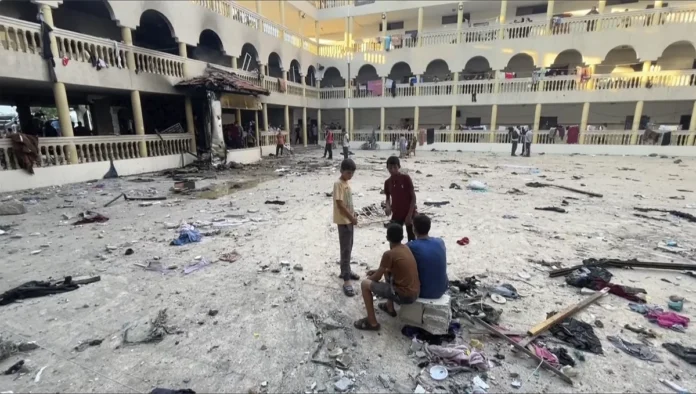Israel bombed two UNRWA schools in the al-Shati refugee camp in Gaza City on Saturday, just minutes after issuing fresh expulsion orders for multiple buildings across the city, according to Al Jazeera reports. The strikes have once again highlighted the escalating humanitarian toll of the ongoing conflict in Gaza.
The targeted schools had been serving as makeshift shelters for hundreds of displaced families who fled from other parts of Gaza amid Israel’s military campaign. Witnesses reported scenes of chaos and devastation, with many families caught off guard by the sudden strikes despite the schools’ longstanding designation as safe havens under international humanitarian law.
The Israeli military had also issued evacuation notices for several residential buildings shortly before the attacks. Among them was the al-Rayas residential block, a complex of four high-rise towers housing dozens of families. Residents were reportedly given only minutes to leave before bombardments began.
This pattern of issuing last-minute expulsion orders before airstrikes has become increasingly common during the incursion into Gaza City. Human rights groups and UN officials have repeatedly condemned the practice, arguing that such limited warning times make it nearly impossible for residents to evacuate safely, especially the elderly, children, and people with disabilities.
UNRWA, the United Nations Relief and Works Agency for Palestine Refugees, has come under immense pressure as its facilities, originally designed for education and basic services, have been overwhelmed by the influx of displaced civilians.
More than one million people in Gaza are believed to be sheltering in UNRWA-run schools and buildings, according to humanitarian agencies.
UNRWA spokespersons have previously warned that their facilities were no longer safe amid the escalating airstrikes, with repeated calls for all parties to respect the protected status of schools, hospitals, and civilian shelters under international law.
Saturday’s bombing is the latest in a series of attacks on such facilities, deepening concerns over potential violations of the Geneva Conventions.
The strikes come as Israel continues its ground operations and aerial bombardments in Gaza City, one of the most densely populated areas in the enclave. The humanitarian situation has deteriorated rapidly, with shortages of food, clean water, and medical supplies compounding the crisis.
Thousands of families have been displaced multiple times, seeking shelter in schools, hospitals, and public spaces, only to find those locations also targeted in strikes.
Regional and international reactions are expected to follow, with growing calls for an immediate ceasefire to prevent further civilian casualties. However, political deadlock at the UN Security Council and the entrenched positions of both sides have left little room for diplomatic breakthroughs.
For civilians in Gaza, Saturday’s events reinforced a grim reality: even UN-marked schools and supposed safe zones offer no guarantee of protection. As the conflict shows no sign of abating, the humanitarian cost continues to climb, leaving the enclave’s most vulnerable caught in a relentless cycle of displacement and danger.

